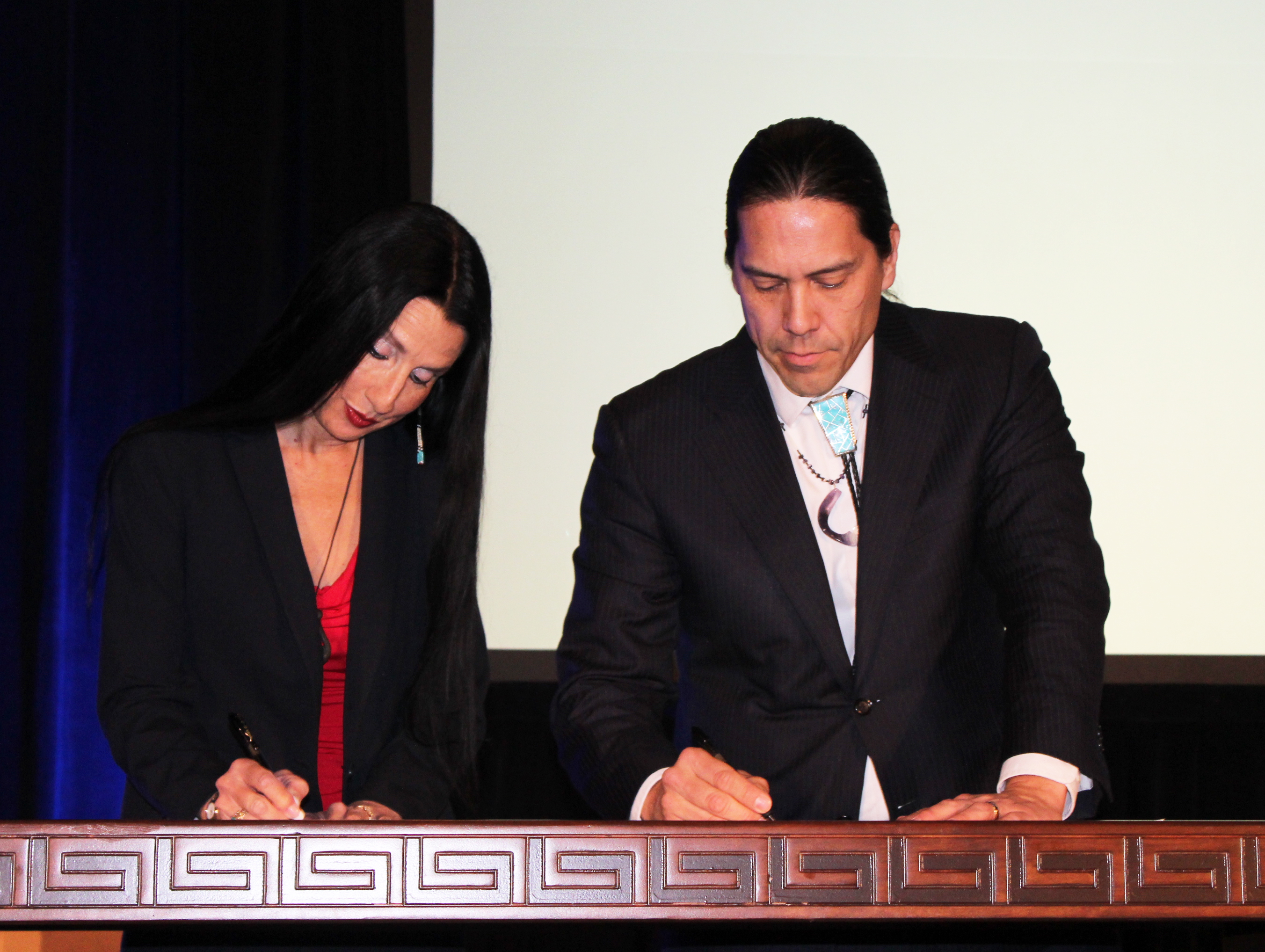
Tempe, Ariz. - Arizona State University signed a Collaborative Agreement with the Native American Finance Officers Association (NAFOA) on April 19, 2016 formalizing a long-standing partnership and commitment to building the Tribal Economic Leadership (TEL) Executive Education Program bringing financial and economic development training to Indian Country.
The Collaborative Agreement was signed by Dr. Rebecca Tsosie, ASU Vice-Provost with the Office for Inclusion and Community Engagement, and NAFOA’s President Bill Lomax during NAFOA’s 34th Annual Conference held on April 18-19, 2016 at the Gila River Indian Community. Dr. Tsosie, who is also Regents’ Professor of Law in the Sandra Day O’Connor College of Law, signed the agreement on behalf of ASU President Michael Crow.
The development of the TEL Program is an outgrowth of the highly successful Tribal Financial Managers Certification (TFMC) training. The TFMC training, which ASU AIPI and NAFOA have partnered in presenting since 2009, has trained over 340 tribal leaders, tribal CFOs, tribal accountants, and other tribal professionals in sound economic, fiscal management, tribal governmental finance, Indian law, and economic development. The spring 2016 cohort of the TFMC program will be held on May 23-25, 2016 at the ASU campus.
“ASU is honored to partner with NAFOA for such an important goal of improving the economic condition and capacity of Tribal Nations that builds on the work that we’ve already started together,” said Jacob Moore, Assistant Vice-President of Tribal Relations for ASU. “To paraphrase President Crow, ‘ASU aims to be a university measured not by whom it excludes, but by whom it includes and how they succeed.’”
ASU and NAFOA have long recognized the need to build a strong professional development curriculum that develops a greater understanding within Indian Country of the importance of building internal infrastructure to grow strong tribal economies. The new TEL program offers specialized executive leadership training for tribal governments, Native American organizations, and others that work in Indian Country.
The goal of the program is to arm tribal practitioners and those who work with tribal entities with knowledge of the nuances of tribal governance and finance. Grant management, accounting, and taxation and compliance are complex in their own right, but there are added layers of reporting in tribal applications. Not having a good understanding of these additional regulations can subject entities to fines and endanger funding. The TEL Program will provide a variety of trainings and professional development opportunities that will enable tribal leaders, executives, government representatives (tribal, state, and federal) and financial practitioners to better understand the regulations surrounding tribal funds management.
“ASU has a demonstrated a deep commitment and responsibility to the Native nations and Native peoples the University serves. We could not have asked for a better partner in building out meaningful professional development opportunities,” said NAFOA’s President, Bill Lomax. “This collaborative partnership will combine our strengths to expand the capacity building of Indian Country.”
The ASU AIPI is an applied policy program leveraging university expertise via a reciprocal transdisciplinary model, infusing Native knowledge in the academy, and engaging Tribal Nations in building community partnerships in order to inspire the Seventh generation of leaders.
AIPI is fully committed to tribally-driven participatory research in which tribal governments identify their own research needs and seek out collaborations with the university. As part of tribally-driven participatory research, the AIPI responds to tribal research direction and empowers Tribal Nations, tribal communities and American Indian students through projects that support self-determination and build tribal capacity.
AIPI strives to provide thought leadership in American Indian communications policy and applied media work to enhance our local impact and social embeddedness serving Native Nations. By providing progressive policy analysis, research, and education, the AIPI seeks to elevate Native Nations in local, regional, national and global communities while creating a dynamic dialogue through multiple communication modalities.
NAFOA is a non-profit organization whose mission is to grow tribal economies by strengthening tribal finance. The organization launched over three decades ago to highlight the role of tribal finance in fostering economic opportunities. NAFOA advocates sound economic and fiscal policy, develops innovative training programs in financial management, builds the financial and economic skills of the next generation, and convenes tribal leadership, experienced professionals, and economic partners to meet the challenges of economic growth and change.
Press Release